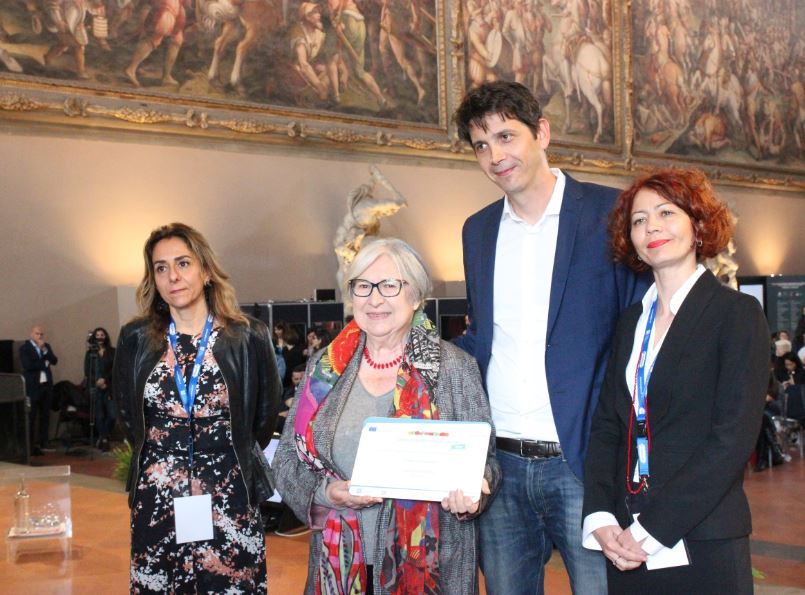 The magnificent the Salone dei Cinquecento served as backdrop for the award of the 2018 Italian European Language Label in the Palazzo Vecchio, Florence. On behalf of the Language for Work project, the coordinator, Matilde Grünhage Monetti, received the prize for the book Lingua e lavoro, a cooperation between the Italian publishers Loescher and LaLinea and the ECML.
The magnificent the Salone dei Cinquecento served as backdrop for the award of the 2018 Italian European Language Label in the Palazzo Vecchio, Florence. On behalf of the Language for Work project, the coordinator, Matilde Grünhage Monetti, received the prize for the book Lingua e lavoro, a cooperation between the Italian publishers Loescher and LaLinea and the ECML.
The most imposing chamber − 52 m x 23 m − built in a single year in 1494 as a seat of the Grand Council (Consiglio Maggiore), hosted the conference “United in Diversity” and the award ceremony within the Festival d’Europa in Florence from 1 to 10 May 2019. (Programme)
Organised by the Italian and French ERASMUS+ National Agencies (INDIRE, INAPP e ANG and the Agence Erasmus+ Education et Formation), the conference, involving over 100 international guests, highlighted the contribution of the Erasmus+ programme towards building a European identity and a sense of belonging to Europe.
The award ceremony called on stage 18 international initiatives that had distinguished themselves for innovative proposals in teaching and learning of languages from primary education to adult and continuing education and VET, in all the countries of the European Union.
The label is awarded annually or biannually in each country participating in the scheme. By supporting such initiatives, at local and national level, the label aims to raise the standard of language teaching across Europe and promote good practice.
The day before the award, the winners had the opportunity to present their projects in the Erasmus+ pavillion in the Piazza della Repubblica. Andrea Ghezzi, from LaLinea, presented the book and Matilde Grünhage-Monetti, one of the editors together with Alexander Braddell, was asked to briefly highlight the issue of work-related second language (L2) development for migrants.
The Lingua e lavoro publication brings together 13 examples of work-related L2 practices across Europe for adult migrants. It focuses on formal, non-formal and informal L2 learning arrangements aimed at improving L2 skills for work, at work and through work. Most of the authors are members of the Language for Work network, created through the two ECML projects “Developing migrants’ language competences at work (2012-2015) and "Language for Work 2: Tools for professional development" (2016-2018), and the two editors are part of the coordinating team of the projects.
Although Italian language courses for adult migrants are widespread, language development focuses mainly on formal education and integration. There is no language support once migrants have found employment. The consequence is that the most vulnerable ones with limited educational capital remain stuck in the so called “low-pay, low-skill-language” trap.
The practices described in the volume show a large spectrum of possible initiatives, through “traditional” qualification courses, or directly on the job, by involving colleagues and supervisors as mentors, or supporting self-directed learning through coaching. They are not intended to serve as blueprints to be transferred automatically to other contexts. However, as a source of inspiration, they can trigger innovative local solutions.
The possibility to expand on the issue, even if briefly, has contributed to raise the awareness of the need to offer support for work-related L2 development among an audience sensitive to language issues, although the majority is involved to a greater extent with formal education. Positive feedback from the audience, among others the representative of Italian Epale, and Rossano Arenare from the agency Inapp, who chaired the presentation of the VET section, demonstrated that the message was understood and well received.
Matilde Grünhage-Monetti